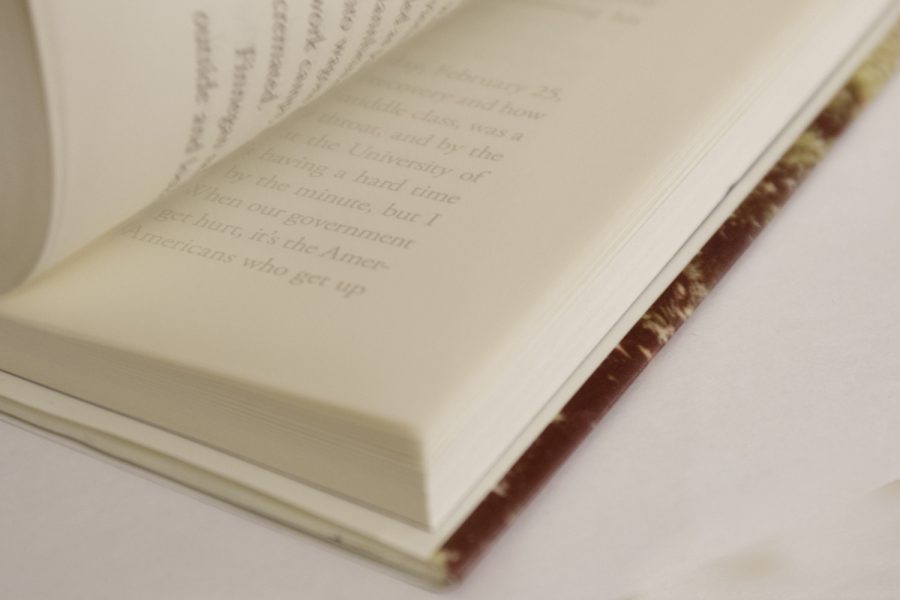Teaching assistants discuss necessity, effectiveness of University policies on student relationships
A close-up of a book.
February 8, 2023
Mya Rivenburg, who worked as a developmental psychology teaching assistant last spring, said forming a relationship with a TA depends on the person and the nature of the relationship.
“Some people are able to create those boundaries, but in other cases it can cause an unfair advantage,” Rivenburg, a senior microbiology major, said.
The University established a policy in 2017 regarding consensual romantic and sexual relationships “in an effort to ensure that the University’s educational and work environment is based on professional relationships in an atmosphere of mutual trust and respect.” The policy outlines that faculty and staff members appointed by Pitt such as advisers, coaches, researchers and undergraduate and graduate teaching assistants are prohibited from engaging with students over whom they have direct supervision outside of an academic setting.
While most TAs seem to agree with the policy, some say they were unaware that the policy even existed. Shahd Habeb said she “never heard of the policy” despite having worked as a chemistry teaching assistant her sophomore year.
Jack Mintzer, an organic chemistry teaching assistant, said a TA forming a relationship with one of their students “feels unprofessional and just sounds wrong.” He also said a student and teacher relationship could create disruptions within the classroom.
“It is seemingly more likely that a teacher could be compelled to give exam answers or additional help to that student that other students do not have access to,” Mintzer, a senior biology major, said.
The policy states, “When individuals involved in a consensual romantic or sexual relationship are in positions of unequal power at the University, or closely work together, there is the potential for a conflict of interest, favoritism, and exploitation.”
Rivenburg echoed Mintzer’s feelings and said other students may feel uneasy about the possible advantages that one student may have while dating a TA.
“Developing a relationship while you’re kind of being a teaching instructor and stuff like that, and having an influence on grades, may cause some issues amongst other students,” Rivenburg said.
The University still highly discourages staff and faculty from forming consensual relationships with students even if they do not have direct supervision over the classroom. Habeb said while the policy is important, she thinks there are some student and TA relationships that might not be as inappropriate.
“Once you have passed the class, maybe then if you date a TA in a class you’re not taking, maybe,” Habeb, a senior chemistry major said. “But if it’s a TA dating his own student, then I think that’s just very inappropriate in the workplace.”
Rivenburg also said she believes that in some situations, as long as the relationship between a student and a TA is “pre-existing,” it might be acceptable.
Jamisha Jacobs, a biology lab teaching assistant, doesn’t believe that there is an issue with undergraduate TAs dating a student because they have less influence over the classroom than professors.
“Most TAs do not have a final say in a student’s grades, so the element of control and power is much less than if it’s a professor,” Jacobs, a natural sciences major, said. “Also, most TAs are only about two years older than our students, so it is also not a big age gap problem.”
Jacobs also said the policy should not forbid TA and student relationships, but thinks TAs should sign a contract to make the relationship known to the department they teach in.
“I think this would help to make sure that all relationships are consensual,” Jacobs said.
For any teaching assistant or instructor who violates the University’s policy, sanctions are determined by measures such as “disclosure of the relationship, when the relationship began, and adherence to a management plan.” Habeb also worries that a TA could “subconsciously” provide more tutoring or assistance to a significant other without realizing the power imbalance.
“They can give them way more help than they would give normal other students because they’re in a romantic relationship with them and they are spending that time with them,” Habeb said. “And you always want to see your significant other succeed.”



